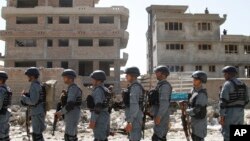KABUL —
Afghanistan's human rights commission has accused the police of a significant amount of violence against women, saying it threatened to undermine public trust in the security forces as they prepare to take full charge of the country.
Though Afghan women have made gains since the collapse of the austere Taliban regime in 2001, violence against them remains widespread. There are fears the gains made could be lost when most foreign forces leave by the end of next year.
Nearly 15 percent of so-called honor killings and sexual assaults were committed by police, the Afghanistan Independent Human Rights Commission said in a report, citing findings gathered from more than two years of data.
“This issue can harm public confidence and trust [in our] national police,'' the commission said.
Honor killings are attacks by a member of a family or a tribe, usually carried out by a man, against another member, usually a women, because of a perception that the victim brought dishonor to the group.
The commission said it had documented 163 cases of sexual assault and 243 honor killings throughout the country from the beginning of 2011 to the end of May 2013.
It said that given the high rate of under-reporting, the real number of cases was probably much higher.
“Due to severe traditional sensitivities and cultural obstacles, a large number of such cases are kept secret.''
The Interior Ministry, which is responsible for the police, rejected the report and said the force had made significant progress towards safeguarding human rights.
The Afghan parliament last month failed to pass a controversial law banning violence against women, dealing another blow to fragile progress made on women rights.
President Hamid Karzai approved the Elimination of Violence Against Women Law by decree in 2009 but it required parliamentary approval before it could be enshrined. The decree banned forced and underage marriage, beatings and rape.
Last month, the law was put before parliament but a rift between conservative and progressive members resulted in it being deferred, with conservatives warning of “blood on the streets'' if it were ever passed.
“The cultural impunity and the lack of follow up of these cases by different organizations and authorities is something we're very concerned about,'' said rights commission chairwoman Sima Samar.
Despite billions of dollars in foreign aid poured into the country Over more than a decade, Afghanistan is regularly declared to be one of the most dangerous places to be a woman.
As the international presence shrinks, many women fear a return to the conditions they faced under the Taliban.
Afghanistan's 152,000 police are routinely accused of abuses and critics say their behavior has pushed many villagers into the ranks of the insurgency.
Though Afghan women have made gains since the collapse of the austere Taliban regime in 2001, violence against them remains widespread. There are fears the gains made could be lost when most foreign forces leave by the end of next year.
Nearly 15 percent of so-called honor killings and sexual assaults were committed by police, the Afghanistan Independent Human Rights Commission said in a report, citing findings gathered from more than two years of data.
“This issue can harm public confidence and trust [in our] national police,'' the commission said.
Honor killings are attacks by a member of a family or a tribe, usually carried out by a man, against another member, usually a women, because of a perception that the victim brought dishonor to the group.
The commission said it had documented 163 cases of sexual assault and 243 honor killings throughout the country from the beginning of 2011 to the end of May 2013.
It said that given the high rate of under-reporting, the real number of cases was probably much higher.
“Due to severe traditional sensitivities and cultural obstacles, a large number of such cases are kept secret.''
The Interior Ministry, which is responsible for the police, rejected the report and said the force had made significant progress towards safeguarding human rights.
The Afghan parliament last month failed to pass a controversial law banning violence against women, dealing another blow to fragile progress made on women rights.
President Hamid Karzai approved the Elimination of Violence Against Women Law by decree in 2009 but it required parliamentary approval before it could be enshrined. The decree banned forced and underage marriage, beatings and rape.
Last month, the law was put before parliament but a rift between conservative and progressive members resulted in it being deferred, with conservatives warning of “blood on the streets'' if it were ever passed.
“The cultural impunity and the lack of follow up of these cases by different organizations and authorities is something we're very concerned about,'' said rights commission chairwoman Sima Samar.
Despite billions of dollars in foreign aid poured into the country Over more than a decade, Afghanistan is regularly declared to be one of the most dangerous places to be a woman.
As the international presence shrinks, many women fear a return to the conditions they faced under the Taliban.
Afghanistan's 152,000 police are routinely accused of abuses and critics say their behavior has pushed many villagers into the ranks of the insurgency.





